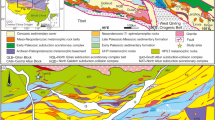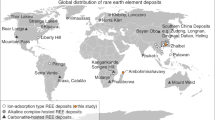Abstract
RECENTLY, investigations were performed on soil allophane, which was obtained in the vicinity of Utsunomiya in the north part of Kanto District of Japan and purified from the alteration substance ejected from the central cone of the Upper Quaternary Akagi Volcano—the unaltered rock-forming minerals being eliminated by cribration and elutriation.
This is a preview of subscription content, access via your institution
Access options
Subscribe to this journal
Receive 51 print issues and online access
$199.00 per year
only $3.90 per issue
Buy this article
- Purchase on Springer Link
- Instant access to full article PDF
Prices may be subject to local taxes which are calculated during checkout
Similar content being viewed by others
References
Morimoto, R., Ossaka, J., and Fukuda, T., Bull. Earthquake Res. Inst., 35, 359 (1957).
Roy, R., and Tuttle, O. F., Physics and Chemistry of the Earth, 1, 138 (McGraw-Hill Book Co., New York, 1956).
Author information
Authors and Affiliations
Rights and permissions
About this article
Cite this article
OSSAKA, J., IWAI, S. Transformation of Allophane to Kaolinite under Low-grade Hydrothermal Conditions. Nature 201, 1019–1020 (1964). https://doi.org/10.1038/2011019b0
Issue Date:
DOI: https://doi.org/10.1038/2011019b0
Comments
By submitting a comment you agree to abide by our Terms and Community Guidelines. If you find something abusive or that does not comply with our terms or guidelines please flag it as inappropriate.



